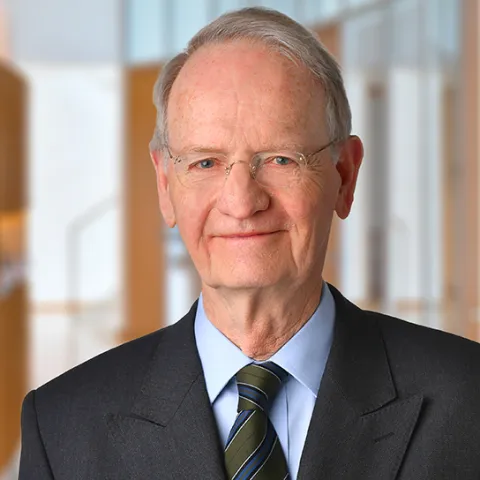Prof. Tilmann: FCC could have several reasons to reject as inadmissible complaint against UPCA
December 12, 2017
It is questionable whether the German constitutional complaint against ratification of the Unified Patent Court Agreement addresses fundamental breaches of the German Constitution. And even if the Federal Constitutional Court thinks this is the case, it may reject as inadmissible the complaint for a decision. Prof. Dr. Winfried Tilmann of Hogan Lovells argues this in an interview with Kluwer IP Law.
In a recent GRUR article, which discussed the merits of the constitutional complaint, you said public interest in information about the case is enormous and the uncertainty among ‘numerous inventors and companies in Europe, in the US, Japan, Korea and China, who expected the UPC to opens its doors soon’ is considerable.
Indeed, the fact that an anonymous individual – later identified as Mr. Stjerna, although he has never admitted this publicly – has been able to delay and/or block the Unitary Patent project by silently filing a complaint, the content of which was unknown, with the Bundesverfassungsgericht (FCC): it took many by surprise. Do you think more openness in the procedure before the FCC (and from parties that have been asked for comments by the FCC) would have been preferable?
’The claimant had presented his line of thinking in several articles before including hints on a possible complaint to the FCC. Therefore, his complaint did not come as a complete surprise. The FCC, in this case, has opened the proceedings by inviting comments from specialized organizations in the patent field, thereby providing at least some transparency. Public discussion on the complaint is possible.’
You expect the FCC not to admit the complaint for a decision, because of the FCC’s restrictive interpretation of Art. 38 (1), clause 1, Basic Law*, on which the complaint is based. ‘There is no right to a judicial review which goes beyond the core of democratic principles, of decisions which have been made by a democratic majority’, you pointed out (Es gibt keinen Anspruch auf eine über die Sicherung des Kerns des Demokratieprinzips hinausgehende Rechtmäßigkeitskontrolle demokratischer Mehrheitsentscheidungen). Can you explain why this may mean Stjerna’s claim and the four concerns he has regarding breaches of the Basic Law will not be admitted?

‘On the basis of recent decisions of the FCC I expect the complaint to be dismissed as inadmissible (unzulässig) if it does not raise an issue of a fundamental breach of the German Constitution (Basic Law, BL) in the meaning of art. 79 (3) BL, but only an issue of a normal sort of conflict with the BL. Realizing this, the complaint does argue with a fundamental breach raising objections under the principle of Rule of Law (Rechtsstaatsprinzip). However, is it true that these objections do have such fundamental character?
In my mind it is not sufficient for the complainant merely to allege that his objections do have such fundamental nature. The FCC could reject the complaint as inadmissible because the objections, evaluated objectively, are lacking such rare quality. I personally have come to the result that they do not have this quality (and that they are unfounded).
Moreover, while in the past the FCC in cases of infringement of fundamental rights has admitted complaints by citizens under art. 79 (3) BL, it has no yet decided whether and to what extent the complaint of a citizen may be brought against a fundamental infringement of the general principles of the Rule of Law. The FCC (rightly) may be hesitant to enlarge the right to sue in that direction. Also, under that aspect, the complaint may be dismissed as inadmissible.’
Many observers think the complaint will be admitted for a decision, pointing at the fact that the FCC has requested comments and views from so many parties: the German government, the Bundesländer and a series of legal associations, for instance.
‘The FCC may be tempted to write history and enlarge the right to sue for the citizen in the field of the Rule of Law. Such landmark decision, however, would probably not be made by the chamber in charge of the complaint, but by the full 2nd Senate of the FCC. Again, the reasons for the complaint do not have the fundamental character which would call for a landmark decision.’
Could you briefly discuss the four reasons brought forward for a fundamental breach of the Rule of Law?
‘First, the complaint raises the question whether Parliament should have decided by a two thirds majority. This argument may only be successful, if the FCC accepted a fundamental breach of the Rule of Law. According to a recent FCC decision the argument may not be raised regarding a normal conflict with the Constitution.
Secondly, the complaint criticizes the procedure to elect and re-elect judges, especially criticizing participation of lawyers in the deliberations and decisions of the Advisory Committee and criticizing that there is no appeal in case a judge is removed from office. An extensive research by EPLA has shown: The election and reelection procedure is squarely within the practice regarding international courts. An appeal of a judge who has been removed from office may be introduced by a simple decision of the Administrative Committee.
Thirdly, the complaint argues that the UPC Rules of Procedure have no democratic basis. However, all major rules of procedure are contained in the UPCA itself leaving only the details to the Rules of Procedure. The draft UPC Rules of Procedure were known to Parliament when deciding on the law implementing the UPCA.
Fourthly, the complaint criticizes the rules on the recovery of costs by the successful party as disadvantageous for SME. Presently such rules exist only as a draft awaiting a decision of the Administrative Committee after the beginning of the preliminary application. The draft is the result of a compromise between different national systems.
In my opinion, all four arguments are not founded and, certainly, do not raise questions of the fundamental character required by art. 79 (3) BL.’
Mr. Stjerna has also claimed that the UPCA violates Union Law. Even if his complaint will be admitted for a decision, you think these claims will neither succeed nor be referred to the CJEU. Can you explain?
‘The FCC has decided that a constitutional complaint is not admissible against a law arguing that this law infringes Union Law**. The FCC's argument is that the TFEU has been incorporated into German law by a simple law (not by a law of constitutional character). Therefore, a new German law containing matter inconsistent with Union law would raise only a conflict with a simple law, not with the Constitution.
Moreover, the four reasons put forward by the complaint to support the assertion of a conflict with Union Law have already been decided by the CJEU in Opinion C-1/09 and in the 2nd Spanish action or are so clearly unfounded that a referral to the CJEU is not necessary. For these subsidiary arguments I refer to my article in GRUR.’ (Winfried Tilmann: Das europäische Patentsystem – Stopp vor dem Ziel? (subscription))
* BVerfG 21. Juni 2016 - 2 BvR 2728/13
** BVerfG 04. November 2015 - 2 BvR 282/13
For regular updates on the Unitary Patent and the Unified Patent Court, subscribe to this blog and the free Kluwer IP Law Newsletter.
You may also like














Let us all push, maybe the media will then push with us....
So, once it is unproblematic due to the RoP having been known to the Bundestag and therfore any objection against democratic control no reason for a complaint, and next point it is that the RoP are only provisional and will be changed by the AC anyway... I find this contradiction put so close (thridly and fourthly) together very... interesting, and it shows the mindset of 'Prof.' Tilmann....
We are not as gulllible as you think
The article in GRUR is merely an adapted version of a lecture given by Mr T. at a gathering organised by the University of Düsseldorf at Schloss Mickeln on 24.10.2017. I have some difficulties in following the quite apodictic views of Mr T. First it does not appear plausible that the FCC would ask the president of the German Republic to postpone signing the ratification act if it could be dismissed as simply as is claimed. It has too far reaching consequences to request such an unusual move, without considering that prima facie that the complaint could have some merit. The same applies to the fact that the time limit for amicus curiae briefs has been extended until the end of this year. Does Mr T think that the FCC would take all those steps in order to summarily dismiss the complaint? He would be very naive, what I do not think for one second. I do not rule out that eventually the complaint will not be admitted, but the reasons for this would have a bit more substance than Mr T’s performance. The views expressed are very personal and are not supported by any precise case law of the FCC. Examples: “In my mind it is not sufficient…”, “I personally have come to the result…”, “In my opinion, all four arguments are not founded and,…” “I expect…” Decisions of the FCC are mentioned, but not identified. In such a situation, it is very easy to claim whatever suits your case. Examples: “On the basis of recent decisions of the FCC I expect…”, Mr T. quotes two decisions of the FCC, but the conclusions he draws are not quite apparent from the decisions themselves. When Mr T is alleging that “An extensive research by EPLA has shown….”, he probably meant EPLAW (and not the old EPLA), and there I could only find one article of Mr Pagenberg “PC Judges – How will the Judges of the UPC be chosen and appointed?”, in which nothing comes near to the allegation made. If he really meant EPLA, he will have to explain what the dead borne EPLA has in common with the UPC. Wherefrom Mr T. takes the conclusion that “The election and re-election procedure is squarely within the practice regarding international courts. An appeal of a judge who has been removed from office may be introduced by a simple decision of the Administrative Committee” remains a mystery. The last sentence is further not a model of clarity. Further, it is a bit easy to claim that the RoP were known by the parliament when it ratified the UPC. As far as I know we are still at the 18th draft, but a draft is not a firm version of the RoP. Th parliament might have known a draft version of the RoP, but certainly not the final one. And when one knows that the RoP have been concocted by a committee which co-opted all its members, it is hard to see that the genesis of the RoP has been a clearly democratic exercise. In order to dismiss the argument according to which the rules on the recovery of costs by the successful party as being disadvantageous for SME, Mr T. says that : “Presently such rules exist only as a draft awaiting a decision of the Administrative Committee after the beginning of the preliminary application. The draft is the result of a compromise between different national systems.” However the rules of recovery of costs are part of the RoP. Hence the RoP are still a draft. How can it then be that in one case the parliament knew the RoP as being firmly decided, and in the other case the parliament did not know, but in both cases a dismissal of the complaint should be acted by the FCC? I would expect a bit more coherence from Mr T. When Mr T. refers to opinion C 1/09, it is worth reminding him that when the opinion came out, Mr T. was of the opinion that the future unitary patent could only be open to member states in the EU, but after the Brexit, Mr T. was adamant that the UK could stay in the UPC post-Brexit, and that even other non-EU member states could join. I think that harmonisation in Europe is to be welcomed, but not the kind of harmonisation, some people want us to swallow. Mr T. has vested interests in the success of the UPC, and every statement he is uttering has to be seen in this context. I have therefore strong doubts about the objectivity of Mr T., the more so that he has shown in the past, that he is quite prompt in changing his mind, when his interests could suffer. Techrights: fingers off!!
sandman
It is not worth commenting this in detail, this is Tilmann's dreamland. T distorts the facts just as it suits him, already his allegations on the complaint's contents are erroneous in several respects (and changing with each piece he publishes). The BverfG decisions he cites are discussed in the complaint, he simply attributes to them the meaning he needs for his fabrications. I don't know for whom he is writing this, but the court will certainly not be impressed.
Concerned observer
Winfried, I did not realise that you were such an expert in constitutional law. It remains to be seen whether there is any substance to your allegations that the BVerfG will only be concerned with "fundamental" breaches of the basic law, and that the grounds raised by the complaint do not reach that threshold (despite the fact that ratification of the UPC Agreement would result in the transfer of sovereignty away from the national courts). Forgive me if I have serious doubts on this point. As to the oft-repeated assertion that the CJEU's rulings on Spain's challenges (either alone or together with Opinion C-1/09) have already dealt with all of the points relating to EU law, please stop with this nonsense! Indeed, it is not that hard to understand why that assertion cannot possibly be correct. Firstly, the challenges by Spain were against the two EU Regulations that form part of the UPP: allegations regarding non-compliance with EU law were rejected as inadmissible. Secondly, Opinion C-1/09 does not relate to the UPC Agreement at all. Thus, the CJEU has decided nothing of any substance on the issue of whether the implementation of the UPC Agreement under the national law of a Member State would lead to that Member State breaching EU law. If compliance of the UPC Agreement were that simple, then someone would have answered the question that I have been (repeatedly) posing for a long time now: is the UPC "an international court” or a Benelux-style “court common to the (EU) Member States”)? If it is the latter, then the UK clearly cannot participate post-Brexit. However, if it is the former, then the UPC will not comply with EU law (as it will be incapable of making preliminary references to the CJEU under Article 267 TFEU). So which of those two options would you pick, Winfried?
Concerned observer
To clarify, I meant to say that allegations regarding non-compliance OF THE UPC AGREEMENT with EU law were rejected (by the CJEU, in Spain's action) as inadmissible. Of course, this does not mean that the CJEU is unable to consider the CONSEQUENCES of non-compliance of an international agreement with EU law. This is because national laws of EU Member States cannot escape the supremacy of EU law. Moreover, Article 351 TFEU compels Member States to ensure that their national laws are compatible with EU laws - regardless of the existence of contrary obligations under international agreements. (This is perhaps an over-simplification, but the point remains that Member States are forbidden from concluding international agreements that contravene their obligations under EU law.) We should also remember that there are other objections against the UP Regulations that could be raised but that were not raised in either of Spain's challenges. The retroactive application of a new law of infringement springs to mind here as one effect of Regulation 1257/2012 that looks very much like it would contravene important principles of EU law (such as legal certainty and the protection of legitimate expectations). Moreover, even if the UPP comes into force, there is nothing stopping the CJEU from SUBSEQUENTLY invalidating the whole of that Regulation (or at least Article 5(3)) if it decides that there is a problem here. From this perspective, I would have thought that proponents of the UPC would have an interest in clearing this point up before the UPC "goes live". Surely not even the most ardent proponents of the UPC could possibly advocate proceeding down a path that stands a high risk of creating huge legal uncertainty (perhaps even legal chaos). This is because to do so would present such proponents with an impossible conflict between their interest in benefitting financially (from the advent of the UPC, as well as from business generated by the legal uncertainty that it will bring) and the interests of their clients in maximising legal certainty (and minimising their legal bills). Of course, this assumes that such UPC proponents have fully informed their clients of the huge legal uncertainties that would result from the UPC "going live". But surely no one would deliberately "hide" such valid concerns from their clients, would they?